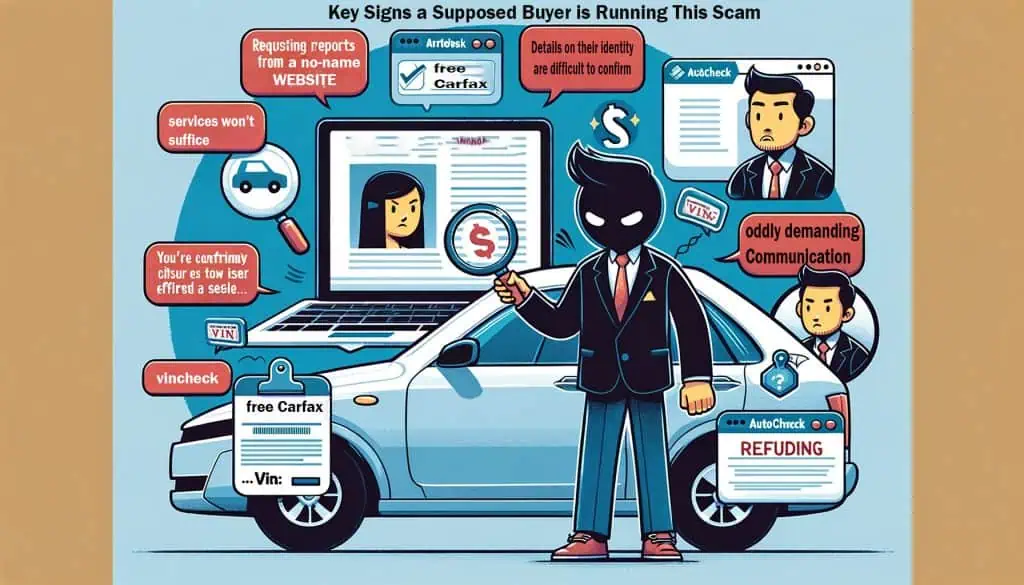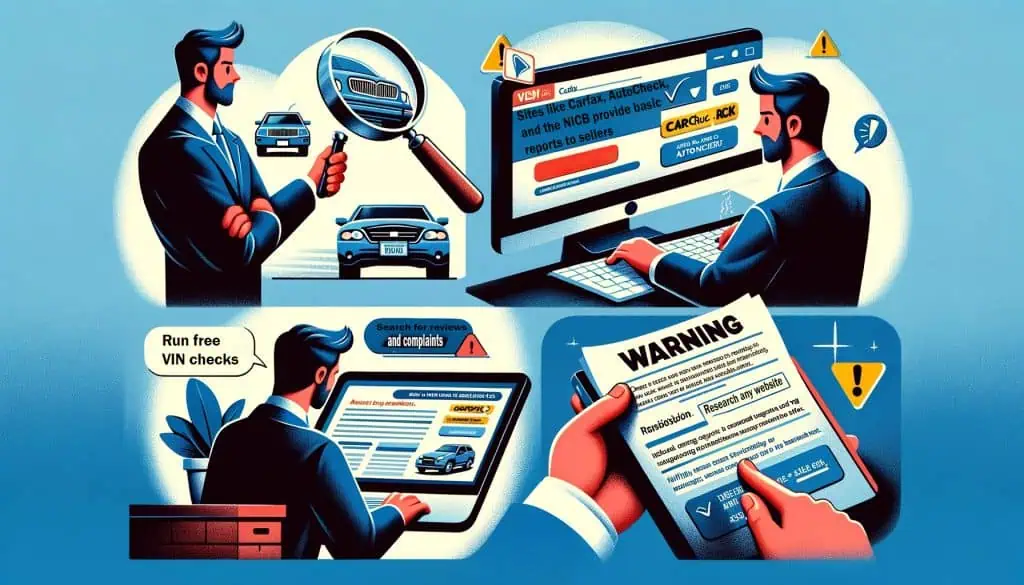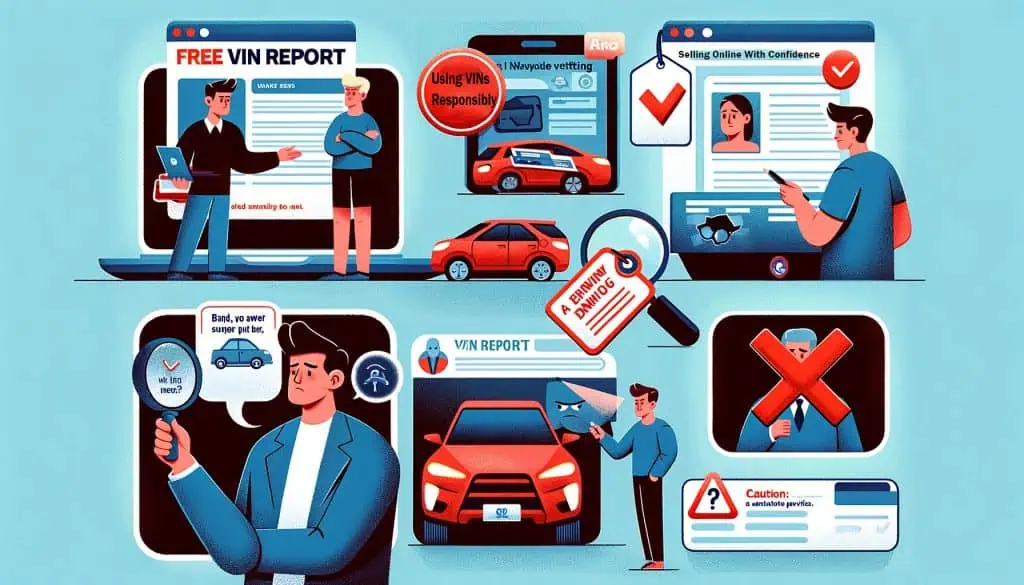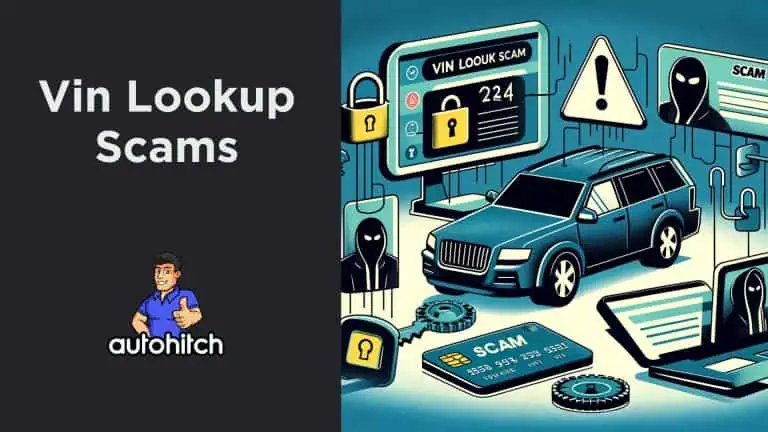One sneaky new, used car scam involves supposed “buyers” insisting you provide a vehicle history report from an unknown, fraudulent website.
These VIN lookup scam sites steal your money and information.
As a former used car dealer, I’ve seen vehicle sales scams evolve dramatically with new technology. Here’s what you need to know to avoid the latest VIN lookup cons targeting private sellers…
Table of Contents
Relevant Articles To Read:
- How To Find The Title Number For Car
- Red Flags or Signs of a Scam When Buying a Car
- What Trim Is My Car By Vin
- How To Find Owner of Car by Vin
- Carfax Vs Autocheck For Vehicle History Reports
What Exactly is the VIN Lookup Scam?
The Vin Lookup Scam typically begins when a “buyer” contacts you about your sale listing. After some initial questions, they ask you to provide a VIN report to check for title issues, accidents, or damage history.
Helpful Article To Read: What can someone do if they get your vin number?
But then comes the red flag. The buyer specifies you must obtain this mandatory report from a single unfamiliar website they recommend.
If you visit this mysterious third-party site and pay a $30 to $60 fee to “run the VIN,” the report you receive will be useless.
Worse, your credit card details are now exposed alongside personal information entered on the site.
You never hear from the “buyer” again after getting confirmation you purchased the report. They disappear with your money and data, leaving you with no sale and an invalid vehicle history report.
Key Signs a Supposed Buyer is Running This Scam

As a seller, be cautious if you encounter any of these suspicious patterns:
- They request reports from a no-name website you don’t recognize
- They refuse free Carfax or AutoCheck reports you provide
- They cannot explain why other services won’t suffice
- The site name involves “.vin” or “vincheck” to seem legitimate
- Communication seems scripted or oddly demanding
- Details on their identity are difficult to confirm
No genuine buyer will require you to use new, questionable websites you’ve never heard of. This should instantly signal a scam attempt.
Consequences of Falling for The VIN Scam
Beyond losing the $30 to $60 spent on the worthless VIN report, you also risk far greater financial and privacy loss.
These sham websites capture your credit card information, full name, address, VIN, phone numbers, and more.
Criminals use this data to perform identity theft, steal funds, or sell your information on the dark web.
The risks go beyond losing money on a fake report. Once scammers have your data, the threat to finances and privacy remains indefinitely.
Safely Checking a VIN When Selling Cars Online

You can avoid endless worrying about VIN report ripoffs with these simple precautions:
- Run free VIN checks yourself using reputable, mainstream providers. Sites like Carfax, AutoCheck, and the NICB provide basic reports to sellers.
- Research any website you don’t know fully before entering personal data, even a VIN. Search for reviews and complaints.
- Insist buyers run their own reports using providers you trust if your free reports are insufficient.
- If a supposed buyer refuses anything but an unfamiliar site, cease contact immediately.
Feeling confident when selling your car online boils down to controlling the process yourself using reputable websites you access and approve. Never surrender that control to a random “buyer.”
Reporting VIN Scams to Protect Other Sellers
If you already got duped by a VIN scam website, take these steps ASAP:
- Notify your payment provider and bank to halt future charges and fraud.
- Report details to the FTC to get fraudulent sites investigated and shut down.
- File police reports to have an official record if identity theft does occur.
- Leave online reviews warning other sellers about the scam website.
The more victims speak up about VIN scams, the quicker authorities can build cases against them. Make your voice heard to prevent these same criminals from deceiving additional victims.
Selling Online With Confidence Using VINs Responsibly

Despite scams, VINs provide buyers with crucial vehicle history information and build the trust necessary for someone to eventually buy your car.
Refusing to disclose VINs when selling online seems unnecessary as long as you take reasonable precautions.
As a seller, make sure you:
- Run your own free VIN report using a trusted provider before listing.
- Share the free VIN report you obtained in your sale listing.
- Vet the identity and intentions of buyers extensively before trusting their judgement.
- Avoid enabling buyers’ info access; never enter credit card details anywhere for them.
And if you’re asked for pricey VIN reports from shady new websites? Shut that nonsense down immediately.
My Closing Thoughts On Vin Scams
Responsible use of VINs revolves around staying vigilant against subtle manipulation attempts and high-pressure tactics from supposed buyers.
With awareness and preventative steps, you can leverage VINs safely to help sell your car faster while avoiding providing scammers openings to steal your hard-earned money or identity. Limit risk, check VINs wisely, and avoid shady websites.
Sources and References:
- https://magazine.northeast.aaa.com/daily/money/auto-loans/how-to-avoid-vehicle-history-report-scams/
- https://www.snopes.com/articles/436483/vehicle-history-report-scam/
- https://www.reddit.com/r/kijiji/comments/160576b/is_this_a_scam_asking_for_my_vin/
- https://www.tdi.texas.gov/podcast/how-to-check-used-car-history-and-avoid-scams.html
- https://www.pennlive.com/news/2023/09/scammers-target-people-selling-used-vehicles-with-a-specific-demand-can-you-send-me-a-vin-report.html



